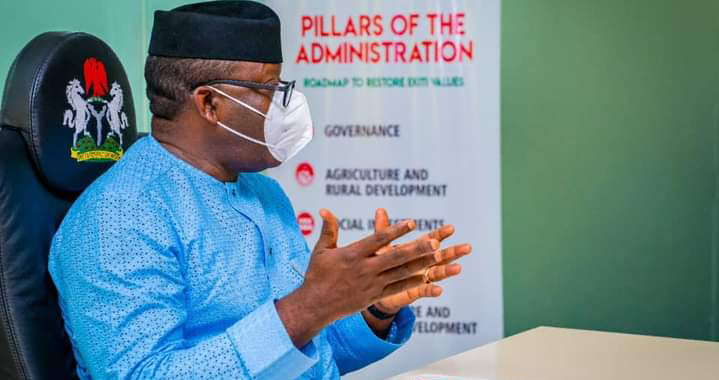…focuses on completion of legacy projects
The Government of Ekiti State has disclosed plans to purchase drones (unmanned aerial vehicles) as part of measures to boost security surveillance, expose criminal hideouts, and combat security challenges in the State. The government is also set to complete many of its ongoing legacy projects this year through the 2021 appropriation.
Commissioner for Budget and Economic Planning, Mr. Femi Ajayi, disclosed these while providing a detailed analysis of the 2021 budget to journalists and critical stakeholders in Ado-Ekiti at the weekend.
Ajayi said the state government projected a sum of N550 million to purchase the drones as part of plans to tackle rising cases of armed robbery, banditry, and kidnapping in the state and ensure that the lives and properties of residents are safe.
Dr. Kayode Fayemi had on December 23, 2020, signed the 2021 Appropriation bill of N109 billion into law, days after it was passed by the State House of Assembly.
According to Ajayi, the 2021 budget size which was a 17 percent increase on the 2020 revised budget size of N91 billion has a recurrent expenditure of N58 billion and capital expenditure of N51.6 billion, a 53:47 recurrent to capital expenditure ratio.
Ajayi who was flanked by the Commissioner for Information and Values Orientation, Barr Akin Omole, Director General, Office of Transformation, Strategy and Delivery (OTSD), Prof Mobolaji Aluko; and Chief Press Secretary to the Governor, Mr. Yinka Oyebode, explained that the budget would be financed through earnings from Federation allocation, Internally Generated Revenue, Value Added Tax, funds from international donor agencies, grants from Federal Government, State Fiscal Transparency Accountability and Sustainability (SFTAS), State Covid-19 Action Recovery and Economic Stimulus (CARES) and sundry sources.
According to the statistics released by the Commissioner, infrastructure, and industrial development under capital expenditures got the highest allocation of N19.6 billion, which constitute 45 percent of the total capital expenditure. It was followed by governance and Social Investments with 22 percent and 20 percent respectively.
Ajayi also explained that the state government will continue to focus on the completion of critical capital projects in the state, adding about N18 billion was budgeted for personnel cost, which he said includes provision for the payment of consequential adjustments as agreed for the new minimum wage.
He added that a sum of N1.9 billion has been appropriated to agriculture and rural development to boost food production and enhance the distribution of agricultural products to both new and existing markets.
He said: “The Government is committed to instituting measures aimed at improving revenue generation in the State by harnessing huge revenue potentials and opportunities in the informal sector to enhance the economic growth of the State.
“To this end, the present administration has proposed the sum of One Hundred and Nine Billion, Six Hundred and Sixty Six Million, Three Hundred and Seventy-Six Thousand, Seven Hundred and Twenty-Two Naira, Sixty One kobo (N109,666,376,722.61) only indicating an increase of 17% over and above the sum of Ninety One Billion, One Hundred and Twenty Eight Million, Nine Hundred and Ninety-Six Thousand, Four Hundred and Eighty-Two Naira, One Kobo (N91,128,996,482.01) projected as Revenue from all sources in 2020 Revised Budget.
“The 2021 Revenue projection is expected from Federal Allocation, Internally Generated Revenue, Value Added Tax (VAT), Funds from International Donor Agencies (IDA), Grants from the Federal Government, State Fiscal Transparency Accountability and Sustainability (SFTAS), STATE COVID-19 Action Recovery and Economic Stimulus (CARES) and other relevant sources.”
Ajayi said that the budget was in line with the fiscal policy of having a purposeful and all-inclusive budget that would serve as a tool for the implementation of socio-economic policy and prudent management of available resources.
The Commissioner during the presentation which was also transmitted virtually said the budget was designed to deliver on Agriculture and Rural Development, Infrastructure and Industrial Development, Social Investments, Knowledge-Economy and Good Governance which are the five key pillars of the Kayode Fayemi administration’s development agenda which are geared towards improving the standard of living of the masses in the State.
Last modified: January 17, 2021

